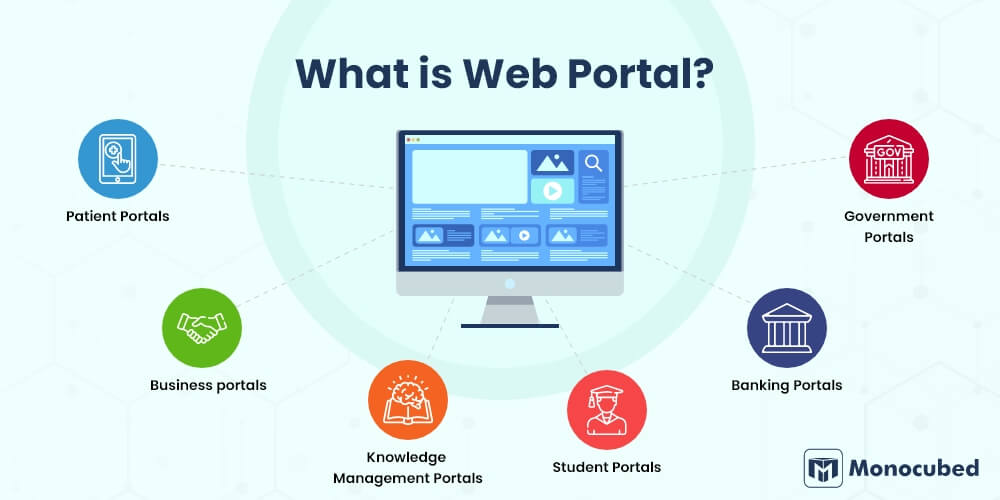Are you confused between a website and a web portal? Let us start by first understanding what a web portal is?
Web portals are also known as portal websites, portal sites, or web gateways.
These are the most visited web portals in 2022:
- Google: 85.5 billion
- YouTube: 33.8 billion
- Facebook: 19.0 billion
Being a custom web portal development company, we have in-depth understanding of web portal development. If we compare it to the website, web portals have very specific and target-oriented audiences like company staff, state residents, site visitors, members, partners, or clients.
Check the following blog to understand what is a web portal, the difference between a website vs a web portal, types of web portals, and examples of web portals.
Table of Content
What is Web Portal?
Web portals definition is simple. The meaning of a web portal is to help users with a wide range of features that include user login, analytics dashboard, chat, navigation, and business-specific features. Web portals are accessible from multiple platforms as well.
Do you know how to develop a web portal? Well, portals usually display personalized content according to user experience to maintain engagement.
The basic concept of the web portal is personalized access to a specific user. For example, offices with multiple employees usually are given personalized access to manage their workflow individually.
If we talk about the biggest strengths of web portals, it will be the following:
- Integration
- Consistency
- Personalization
You have clearly understood the meaning of web portal. Next, learn how the web portal exactly works.
How Does a Web Portal Work?
The simple web portals are like a specially designed website for user-specific content. Know what is web development along with its examples and benefits. Web portals are made with advanced features for authorized users as it requires user IDs and passwords for further use or to make changes to that website. Explain web portal with examples for better understanding.
Which are the Basic Types of Web Portal?
Now that we have learned what are web portals, let us check the different types of web portals. There are two core types of web portals. Let’s understand each in detail.
-
Vertical Web Portals
Basically, vertical portals focus on specific business or application functions such as accounting and finance, CRM, service management, or company management. Vertical web portals enable s users from both sides the members and the visitors to see, edit, and contribute to processes within that given application. Portals like student web portals, employee web portals, or patient portals are examples of vertical web portals.
-
Horizontal Web Portal
What is a horizontal portal? A horizontal portal provides the viewing ability and aggregated data to the user from multiple applications via a single view experience. Horizontal web portals provide information to the entire internet rather than giving personalized access to target a specific audience. Such portals as public service portals and knowledge management portals are examples of horizontal web portals.
Now, let’s see some web portal examples for better understanding.
Want to Know the Cost of Building a Web Solution?
Talk to us. Share your requirements with our web development consultants and get a custom quote.
8 Most Popular Examples of Web Portals
The following list consists of examples of well known web portal.
-
Patient Portals
Patient portals are very convenient for patients who want to track all their data such as the last doctor’s visit, prescribed medicines, upcoming health check-ups, medical personnel, lab reports, and digital medical certificates. Also, by using the patient portal patients can communicate with their doctors and make payments online. As it is a portal, it is secured with your personal user ID and password.
-
Business Portals
Web portals for business mean the online business portal that has been developed by the contractor or a business owner to provide information, registration, corporate intranets, and compliance-related services to businesses doing or intending to do. Basically, a business portal provides many kinds of services and content.
-
Knowledge Management Portals
A knowledge management portal is an internet-based portal that provide collective and creative data online. The knowledge management portal makes the specific content available for team members or partners or stack holders. Basically, a knowledge management portal for businesses should have any and all information about that business and its employees.
-
Student Portals
Basically, the student portal is where students can log in or sign up to see and update such activities as courses, exam forms, results, notices, hall tickets, mark sheets, their previous data of education, and many things related to their school or college life. Usually, every school or college are providing such a portal as a student portal to make the process convenient for students.
-
Banking Portals
Banking portals offer a number of facilities to customers online. The banking portal software is secured to access every customer’s data, and a role-based access module ensures that only authorized personnel can view specific information. This setup not only protects customer privacy but also supports integrated Accountant services, which help users manage their financial data more effectively by providing tailored financial insights while maintaining strict access controls.
-
Government Portals
The government portal is to list the services and the information for the public. Basically, public services portals provide C2G(citizens to government), G2C(government to citizens), G2B(government to business), G2E(government to employees), and G2G(government to government) services.
-
Employee Portals
Employee portals are also known as intranet, employee self-service portals, or enterprise portals. It simply provides a way for any company’s employees to get connected with each other. It offers tools like HR sections which are usually password-protected for security purposes. Using this, employees can become responsible for their own things like work time or lunchtime, applying for day offs, and maintaining leaves.
-
Vendor Portals
Vendor portals are also known as supplier portals or tender portals. Basically vendor portal allows businesses to connect and let collaborate with third-party for business deals online. The supplier portal allows suppliers to track orders, raise concerns and communicate, and ensure that both parties are on the same page. Suppliers have to register themselves on the vendor portals for these types of tasks.
So, we have discussed the top web portal examples in the above section. Do you know the advantages of using these types of web portals? Check below to know the top 5 advantages of web portals.
Top 5 Advantages of Using Web Portal
Why use a web portal for your business? Get your question solved by reading some of the benefits of web portal listed below.
-
Gain an Extended Audience by Making a Positive Brand Image
When a user logs into a web portal, the first thing they will notice is the homepage. Make sure the homepage is tidy, has easy navigation, and is very interactive. The front page will be determined by the type of web-based portal; for instance, users will anticipate seeing educational resources on a college or school portal, while a training portal should highlight the training management-related programs and activities to attract visitors.
When developing a homepage for a web portal, also take into consideration the overall design, the display for videos and news, and whether a quick links menu should be implemented for fast access to data.
-
Access From Anywhere to Improve Productivity in Your Business
You can use your business’s portal from anywhere on any device. That improves business productivity over time. Get easy access from anywhere.
-
Improved Communication Can Lead to More Business Ventures
Communication is the key to achieving more business. The ability to communicate with people both inside and outside your organization is a key to creating a successful business.
-
A User-Friendly Experience by Providing Unique UX
Organizing a huge amount of information and valuable services is important, but sometimes they miss paying particular attention to the user experience. To deliver useful, valuable, accessible, and findable information in a reflexive way that matches the user’s expectations. Because easy-to-understand UX web portals continue to gain an audience.
-
Improved Customer Service With the Client Portal
Customer service using the client portal makes the whole process easier. Client portal platforms are for improving customer service.
Want to Develop Web Portal for Your Business?
We have built more than 50 web solutions and provide engaging web development solution for your business.
After advantages, there is another important part of a web portal which is its features. Let us understand the top features of a web portal:
11 Key Features for Custom Web Portal Development
Here are the top 11 key web portal features of the web portal to take into consideration while developing a web portal for your business.
-
Interactive Home Page
As a homepage is the first thing that a visitor will see while logging into a web portal. Make sure that the homepage is highly interactive.
-
User Personalization
It is one of the most important features that should be considered while developing web portals. There are different types of personalization that companies use to boost the portal experience.
-
Dashboard Recap
The dashboard of a custom web-based portal must provide a recap of important news or recent updates. A dashboard should highlight any tasks that need to be done on priority. Make sure that users can mark these tasks as complete once done.
-
Fast Access to Information
Users need easy access to information so you should focus on a simple design. While creating web portals, you can use an accordion-style content organization that allows information to be well-organized.
-
Tracking Tools
Custom web portals must include tracking tools so that users can track their orders and shipments. Tracking tools can help to avoid creating confusion regarding orders. Apart from that, there are other web development tools which will help you to develop a web application.
-
Social Features
As we all know that social media is now used by every business in every industry. So, custom web portals should include social features that enable users to connect with each other through social media channels such as Facebook, LinkedIn, Twitter, and Instagram.
-
Online Form Creation
Modern businesses depend on technology for completing basic tasks such as filling out forms. Make sure that a custom web portal provides online forms. With this, businesses don’t need to enter data manually into systems and can save many hours.
-
Accessibility on Multiple Devices
Staying in front of your system is not always possible. Make sure that your web-based portal is accessible on all devices including desktops, laptops, tablets, and smartphones. Responsive web portals improve customer interaction and ultimately lead to growth in business productivity.
-
Self-Service Tools
As everyone needs to save time, they prefer to find the information they need on their own rather than reaching out to someone else. Providing self-service tools allows users to save a lot of time as they don’t need to interact with the customer support team for basic activities. They can find the information they want anytime with ease.
-
Content Management
It’s true that content is the king of every business. Yes, this fits right here too. Content is, undoubtedly, the foundation of a custom web portal. The right features can simplify the content management process.
-
Software Integration
Custom web portals can be integrated with our software to make the portals more intuitive. A well-designed, high-quality web portal can be integrated with CRM (Customer Relationship Systems), corporate LMS (Learning Management Systems) and other knowledge management softwares as well.
Check these frequently asked questions if you have similar questions in your mind regarding the web portal.
FAQs About Web Portal Development
-
Why do you need web portal development for your business?
The web portal offers services like a directory of web sites, a facility to search on that site, news information, whether it is weather or facts you can show on your site, e-mail options, map information, stock quotes, phone information, and community forums and forms. A business portal development will help you throughout the process by making everything easier.
-
How does a web portal differ from a website?
There is a difference between a website and a web portal. But they both consist of an interface that is web-based.
A website is a location present on the internet with various web pages that one can access via its URL.
Whereas, a web portal is a point of access in which the content is only available for a set of specific users.
-
Is Google a web portal?
Google is a search engine. A web portal is a customised website to provide information from different sources such as online forums, search engines and emails.
Conclusion
In this blog, you have already got to know how beneficial portal development is for your business or brand. If you’re looking for a scalable solution to deliver a personalized experience to your employees or users, it’s high time to develop a bespoke online portal for employees. Want to develop a portal? What are you waiting for? Being a customer portal development company, we analyze your requirements and we will be more than happy to offer high-performance web portal development services!
 By Jeel Patel
By Jeel Patel



